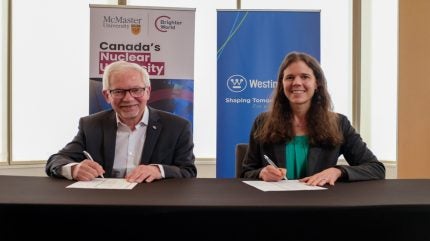
Westinghouse Electric Company and Ontario, Canada-based McMaster University have signed a memorandum of understanding (MoU) and a master services agreement (MSA) to advance the research and development (R&D) of Westinghouse’s eVinci microreactor.
The collaboration aims to move the eVinci technology towards commercialisation, with a focus on significant R&D scopes, including material irradiation and examination studies.
McMaster University is a leading research institution, particularly in nuclear research.
Its campus features the McMaster nuclear reactor, a multi-purpose facility that supports medical isotope production and scientific research.
McMaster is enhancing its reactor testing capabilities with a high-temperature irradiated test rig to support Westinghouse’s design confirmation and licensing approval for the eVinci microreactor.
This partnership, which began in 2022, has already seen McMaster complete a material properties literature review and develop material handbooks to inform engineering design and future testing needs.
McMaster acting vice-president of research Andy Knights stated: “We’re proud to partner with Westinghouse and contribute our research expertise and world-class suite of nuclear facilities in support of their eVinci microreactor programme.
“As Canada’s nuclear university, McMaster is committed to working alongside our industry partners to advance materials and energy solutions for a cleaner world.”
The eVinci microreactor represents Westinghouse’s decades of innovation to offer carbon-free, safe and scaleable energy solutions.
It provides reliable electricity and heating for data centres, the oil and gas industry, mining operations, remote communities, universities, industrial centres and defence facilities.
The reactor is factory-built and assembled before being shipped in a container. It features few moving parts and functions like a battery.
It can provide between several kilowatts and 5MW of electricity and operate continuously for more than eight years without refuelling.
The technology is being considered for use on the lunar surface and beyond.
Westinghouse eVinci technologies president Jon Ball stated: “McMaster University is a strong Canadian research partner, offering years of valuable experience and insights from operating its research reactor that can be applied to our microreactor technology.
“By broadening our collaboration and leveraging McMaster’s unique capabilities, we can further accelerate the commercialisation of our eVinci microreactor.”
Westinghouse Electric Company signed an MoU with Celeros Flow Technology to support new nuclear construction projects in Canada and globally.



